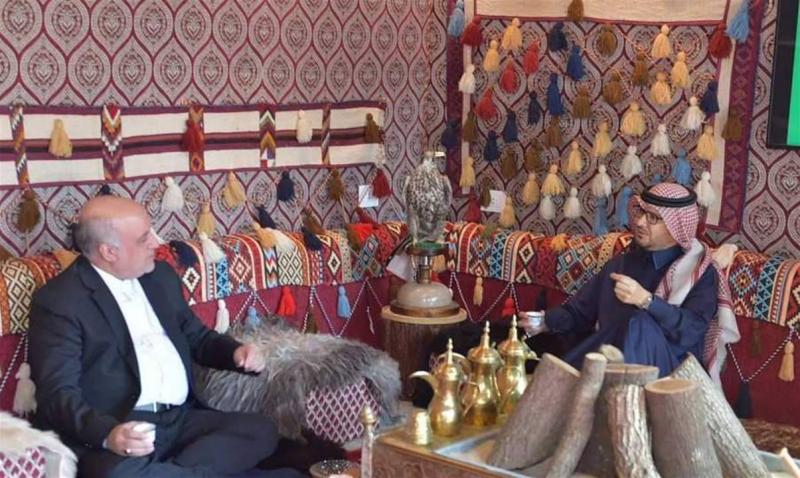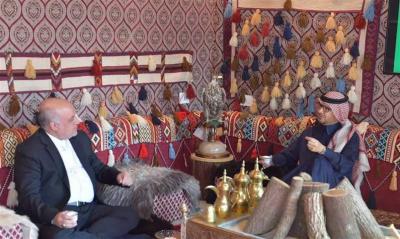The meeting between Saudi Ambassador Walid Bukhari and Iranian Ambassador Mojtaba Amani at the Arab tent in the Saudi ambassador's residence in Yarze is the second diplomatic meeting between the countries' ambassadors in Lebanon after the Sustainable Diplomacy dinner hosted by Ambassador Bukhari at the Venecia Hotel last June, following nearly three months of the Beijing agreement, which was celebrated with over 50 heads of missions and representatives from international organizations, including Iranian Ambassador Mojtaba Amani and Syrian Charge d'Affaires Ali Daghman, as reported by "Al-Liwaa."
This second meeting reflects three essential aspects regarding Lebanon, the situation in Gaza, and Saudi-Iranian bilateral relations.
Firstly, regarding bilateral relations, the meeting at the tent in Bukhari's residence dispels the notion that the Saudi-Iranian agreement has reached a dead end and firmly denies the existence of a party seeking to expand relationships while the other refrains. According to well-informed diplomatic circles, this meeting demonstrates the commitment of both Saudi and Iranian sides to finalize the Beijing agreement and underscores the positive and improving relations between Riyadh and Tehran.
Secondly, the meeting occurs at a time of regional and international tension, making it natural for the regional and international realities, especially the war on Gaza, to be a shared subject of concern between the two countries. Saudi Arabia has engaged in numerous diplomatic initiatives on this matter, having hosted an emergency meeting for the foreign ministers of the Organization of Islamic Cooperation in Jeddah on October 17, then holding two emergency summits regarding the Israeli aggression on Gaza within the framework of the Arab League and the Islamic Cooperation Organization in December. Additionally, Saudi Foreign Minister Prince Faisal bin Farhan led a delegation of Arab and Islamic foreign ministers on a tour of capitals aimed at halting the aggression on Gaza, including Beijing and Washington, and delivered a speech at a meeting on the human rights situation in Palestine alongside members of the joint Arab and Islamic ministerial committee in Geneva, Switzerland.
Furthermore, Saudi Crown Prince and Prime Minister Mohammed bin Salman emphasized to members of the Shura Council in his annual royal speech, delivered on behalf of King Salman, that the Kingdom is determined to foster a joint Arab and Islamic movement to stop the aggression on Gaza. Simultaneously, Iranian Foreign Minister Dr. Hossein Amir Abdollahian has been active regarding Gaza, while Iranian Ambassador in Beirut Mojtaba Amani has noticeably intensified his diplomatic interactions with the French and Saudi ambassadors and appeared in a notable interview on the "OTV" channel close to the Free Patriotic Movement, delivering several messages. One of the most significant messages hinted at the Christian community, stating that Iran cannot overlook Christians in any upcoming elections, especially concerning the presidential election. The Iranian ambassador usually appears on two main channels: Al-Manar TV affiliated with Hezbollah or the "Mayadeen" channel close to Iran.
According to "Al-Liwaa," Ambassadors Bukhari and Amani agreed on a unified perspective regarding the necessity to halt the war in Gaza and prevent its expansion, asserting that the continuation of aggression could lead to the war spreading to other countries in the region. The war in southern Lebanon is merely a consequence of the war on Gaza. The same applies to Syria, Iraq, and Yemen, and there is an Islamic push led by both countries through their diplomatic activities to stop the war.
Regarding the upcoming Lebanese presidential election, according to well-informed sources on the ambassadors' meeting, it appears that a new, more realistic, and rational approach is being adopted by the international quintet concerning Lebanon. Information indicates that the quintet countries have reached a stage where they have separated the Lebanese presidential file from conditional demands imposed on the Lebanese. They are beginning to handle the presidential issue independently, moving away from demands for disarming Hezbollah and its role in Lebanon.
In the previous stage, there were divergent approaches among the quintet countries, with France proposing a balanced presidential settlement among Lebanese parties, while the other countries rejected the French initiative and each imposed their own conditions linked to the presidency. In this phase, these countries are convinced of the necessity for a presidential settlement rather than imposing a president.
In this context, Saudi Arabia, through Ambassador Walid Bukhari, is engaging in intensive diplomatic activities that seem more inclined toward a settlement while not overlooking Saudi demands, particularly regarding a president and a fully empowered government undertaking fundamental reforms.
Informed sources indicate that the change in approach does not mean that the presidential elections are imminent and will happen tomorrow. However, it is considered a positive factor that favors reactivating this issue. The main flaw within the quintet was previously the exclusion of Iran, which led its efforts to continuously hit a dead end in the presidential file, as Iran can communicate with a significant segment of the Lebanese population. After the meeting between Bukhari and Amani, it can be said that the next meeting of the "quintet" will witness the presence of Iranian representation, and the Iranian perspective and approach will be included. Iran's viewpoint, according to well-informed sources on the Iranian climate, emphasizes the necessity for a presidential settlement by regional countries, thus making conditions conducive for a Lebanese agreement and that the settlement will be a Lebanese choice supported by regional and international backing. This practically means that some previously hesitant deputies, who were waiting for a green light to vote, will now be ready to elect based on the upcoming settlement.




